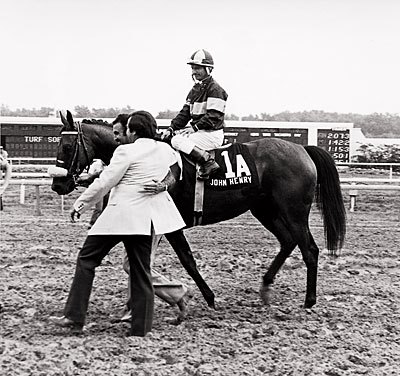The one thing certain about proverbs is that they ring true, and while indeed "all good things must come to an end," it is often the how and why they are over too soon that leaves the acrid taste of acid reflux in the mouth. So it is with the impending demise of Chicago's beautiful horse racing venue, Arlington International Racecourse, and its flagship race, the Arlington Million, which after 40 years looks to be grasping its final straw.
A testament to the "sport"—in every sense of the word's virtues: fairness, integrity, courage, persistence, sacrifice, and the principle that the effort is as important as the outcome—sits for all to see on the balcony overlooking Arlington's paddock. "Against All Odds," a bronze sculpture by Edwin Bogucki, freezes in time the final strides of John Henry and The Bart as the two warriors, every sinew stretched to its competitive limit, strive to reach the wire before the other.

The winner that day, Aug. 30, 1981, was John Henry. Perhaps there is no more fitting winner, for in a way the horse embodies the spirit of Chicago and Arlington, and all they represent. Thus, Carl Sandburg's "stormy, husky, brawling, City of the Big Shoulders" has an equine face.
Foaled in Kentucky, John Henry was 6 years old in 1981 and had been working his day job steadily and thanklessly for four years, making his way unwaveringly through the corporate racehorse world, from the "mail room" tracks of Louisiana. Small and bereft of the glitzier names in pedigrees, the son of Old Bob Bowers and the Double Jay mare Once Double, won his debut, a maiden special weight in the bayou broil of Cajun country. He scored his first stakes in his seventh start: the Lafayette Futurity.
John Henry climbed horse racing's ladder of success slowly, often slipping a rung or two in the claiming ranks before regaining a secure step. Somewhat presciently his first graded stakes success came in his 27th start: the Round Table Handicap (G3T) on turf at Arlington in September of his 3-year-old year.
The little bay gelding, who had been purchased by Sam and Dorothy Rubin for $25,000 sight unseen in 1978, had gained traction on the racetrack and in the press in 1980 when with trainer Ron McAnally, he won six consecutive graded stakes that included three grade 1s at Santa Anita Park and Hollywood Park.

In 1981, this lightning rod for the public's affection, took up where he had left off the previous year: winning graded races. By the time the first Arlington Million rolled around, the now household name had won five of six starts, all graded races, and returned to Chicago for the first time since his Round Table win, off a victory in the Sword Dancer Stakes (G3T) at Belmont Park.
A field of 12 assembled for the inaugural Arlington Million. Among the entries given little chance against John Henry was Franklin Groves' 40-1 longshot The Bart, who had yet to win a graded stakes but had been groomsman in quite a few.
With Bill Shoemaker on John Henry and Eddie Delahoussaye riding The Bart, the race didn't get interesting until the ninth of the 10-furlong trip over the soft turf. The Bart, who had pressed the pace for most of the race, suddenly found himself on the lead with a length-plus advantage over John Henry, who had suddenly thrown his nonchalance in the early going aside and was firmly resolved to run down the leader, (to borrow Sandburg's words) "fierce as a dog with tongue lapping for action." The finish came down to the final stride and John Henry's nose.
This embodiment of Sandburg's "bold slugger set vivid against the little soft cities," raced two more years before he retired with a passel of accolades, $6,591,860 in earnings, and the love of the people who visited him in droves at the Kentucky Horse Park until his death in 2007.







